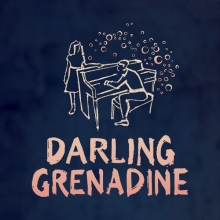
Full Synopsis
Act One
The scene is a brightly colored theatrical boarding house in Coney Island in 1907. A quartet of singers is rehearsing "Mona from Arizona" on the front porch while the dancing Belmont Sisters (a trio) go over their number, and a stilt walker practices his routine. Boarders and neighbors welcome Lottie Gibson (who owns the boarding house) back home after her vaudeville tour across the country. She's a mature but lively lady, down-to-earth, without pretense (except in her choice of clothes); she's decked out in her usual flamboyant style: many colors, many ruffles, feather boa and sparkling fake jewels ("By the Beautiful Sea").
She announces that she's expecting a guest, the "grandest fella," a Shakespearean actor whom she met on the road. He's been booked to play here at the Brighton Beach playhouse, where she, too, is scheduled to perform. She arranges the best room in the boarding house for him.
Among the new occupants of the boarding house are Flora Busch and her daughter, Betsy. Although Betsy is 17, Flora dresses the girl as a thirteen-year-old so as to continue getting her roles as a child actress. They snub Lottie — who is only a vaudevillian — and off they go.
Dennis Emery, the "grandest fella," arrives. He's very distinguished, courtly and handsome. At the request of the crowd following him, he quotes a bit of Shakespeare.
The busy-body Belmont Sisters report to Lottie that this Shakespearean actor is broke and being sued. They read it in Variety; he may not be able to open next week after all. Lottie decides to find a way "to lend him a loan."
That evening, behind the Dreamland Casino, a young waiter named Mickey warns Betsy to keep her distance, thinking that she is the youngster of thirteen — as her mother dresses her ("Old Enough to Love"). He dances for her, and as he dances off, she chases after him.
The Midway and all of its attractions are alive: the "Laughing Man," the rides, the lights, hot dogs, cotton candy, the Ferris wheel, the vendors and the barker selling his wares ("Coney Island Boat"). Among the couples comes Lottie singing a familiar popular tune from the period, "In the Good Old Summertime." (The familiar piece is interpolated into the score — music by George Evans and lyrics by Ren Shields, a song first performed in 1902 in a variety show called The Defenders by Miss Blanche Ring.)
Lottie and Dennis meet and then hurry off to the Old Mill, a tunnel-of-love boat trip. In the dark, their faces are lighted as they float past scenes of horror, alligators, rhinos and skeletons, with Lottie commenting on the sights: "I've known that gorilla since he was a little monkey." As a giant spider appears, she throws her arms around Dennis, and he confesses how smitten he is ("Alone Too Long"). Outside of the Old Mill, the amusement park revelers quietly saunter off with balloons and kewpie dolls. Lovers strolling, boys and girls flirting, the festive evening ends quietly.
Back at the boarding house, Dennis is astonished to find Flora (his ex-wife and Betsy's mother) there. She has arranged to have the sheriff hold Dennis' scenery because he's two months late in his alimony payments. They argue, but Betsy embraces her father, and Flora threatens to drag him into court if he dares to take Betsy. He vows to fight her on this.
Lottie admits to her father, Carl, that she's written a check for $1,000 for Dennis' acting company to get him out of debt to Flora, but their bank account is empty! Carl has just bought the Old Mill. Before the check is cashed, Lottie is determined to find a way out of the situation.
Ruby, Lottie's cook, housekeeper and close friend, educates the residents on what she calls the happy habits: laughin', givin', lovin', even fussin' and 'cussin' ("Happy Habit").
Back at the Midway, the Barker announces prize money for anyone who will go up in the gas balloon to 3,000 feet and descend in a parachute. Lottie volunteers.
On one of the open air stages, the Belmont Sisters and three waiters do their number, "Good Time Charlie." The number progresses to a vendor promoting a penny arcade viewer: "Spicy pictures, a penny a look!" chants the vendor. A ballet featuring the "naughty scenes" of the Iceman and the Wife and similar shockers end the sequence.
In her bedroom, Lottie is trying on a costume for her stunt in the parachute. Betsy barges into the room and they argue. She tells Lottie that her father moved out that very afternoon ("I'd Rather Wake Up by Myself").
It's the Fourth of July. The Pavilion. The balloon basket is on the platform, and all await Lottie's fete ("Hooray for George the Third!"). The barker introduces Lottie's parachute jump from the hot air balloon. She appears in boots and goggles and salutes the crowd. As she rises, the barker announces that the prize money will be presented by none other than the distinguished Shakespearean actor, Mr. Dennis Emery.
After Lottie rises in the balloon, her heroic leap is described moment-by-moment by the barker before we see Lottie land squarely on the platform covered by the parachute silk. Dennis recognizes her and hands her the envelope.
Just then, Betsy rushes in to say that her mama has run off with a man, leaving a note that says that Dennis will have to take care of his daughter from now on. Father and daughter go off together, leaving Lottie alone, tangled in the parachute silk and holding the envelope with the prize money.
Act Two
The second act opens in the backyard of Lottie's boarding house. A Fourth of July party is in progress, and the yard is decorated in red, white and blue bunting, flags and Japanese lanterns. Ruby, serving hot dogs and beer, advises the crowd: "If the devil answers / Hang up!" ("Hang Up").
Lottie enters after the partygoers have left. She confides in Ruby that she made only $87.50 for her stunt. "Some bum" shot out of a cannon stole her crowd away ("Alone Too Long"). Trying to be jovial, Lottie makes light of why she performed the parachute jump, as though she had done it for a lark. He confesses his love for her, that he feared she might be killed in the stunt and that he has no intention of cashing her check. He takes her in his arms and they kiss ("More Love Than Your Love").
Betsy appears at the kitchen door. Conflict erupts as she learns that Lottie is to marry her father. Betsy is determined not to share him. He leaves with his daughter after assuring Lottie that he'll see her tomorrow.
Lottie confides in her father that she made the parachute jump but got next-to-nothing for it because "some big slob in Luna Park gets himself shot out of a cannon!" Her father confesses that he was the "big slob." Under his coat, he's wearing his old acrobat tights. They burst into laughter and embrace.
Montage: a sequence of vaudeville acts on the stage of the Brighton Beach theatre segues into Lottie's act — decked out in a kiddy's costume — singing "Please Don't Send Me Down a Baby Brother," followed by her monologue about how to get rid of sibling competition.
At the Dreamland Casino, an open air pavilion, a brawl is brewing between the waiters and some customers — sailors on leave — so, to defuse the situation, the Belmont Sisters entertain them with "Throw the Anchor Away."
At a table at the Casino, Lottie chastises Dennis for the way that he has neglected his daughter all of these years. She reminds him that he now has a responsibility to bring her up properly and undo all of the harm that the girl has experienced in the past. She claims that they can never marry and leaves ("More Love Than Your Love").
In Lottie's bedroom, Betsy bursts in and confronts Lottie, saying that she is going to run away. Lottie plays into Betsy's rebellious game and offers her some stylish traveling togs. Betsy resists at first, but then gives in... a corset, patent leather shoes, a young woman's dress. Betsy is pleased with her image in the mirror and tops off the costume with a hat that Lottie offers. Betsy kisses Lottie on the cheek and runs off.
Mickey is amazed when he sees how "nifty" this mature young lady looks in her new outfit ("Old Enough to Love"). They plan to meet at Dreamland Casino. Betsy's going to celebrate with four birthday cakes now that she's no longer a thirteen-year-old, but really 17, and instructs Mickey to find her father and bring him there.
At the Casino, the Belmont Sisters come out with the birthday cakes to bring Betsy up to date. All are reunited at the table ("I'd Rather Wake Up by Myself"). Curtain.
Show History
Productions
By the Beautiful Sea is a musical with a book by Herbert Fields and Dorothy Fields, lyrics by Dorothy Fields and music by Arthur Schwartz.
After a pre-Broadway engagement at the Shubert Theatre in New Haven, Connecticut, starting February 15, 1954, and then follow-ups in Boston and Philadelphia, By the Beautiful Sea arrived at New York's Majestic Theatre on April 8, 1954. The original cast included Shirley Booth as Lottie and Wilbur Evans as Dennis. The musical ran for 270 performances, transferring to the Imperial Theatre on October 2, 1954, and then closing on November 27, 1954.
From June 16-27, 1999, a staged concert was presented by "Musicals Tonight" in New York City under the direction of Thomas Mills. The production starred K.T. Sullivan and Sam Freed.
Cultural Influence
- A cast recording of the original Broadway production of By the Beautiful Sea was released by Capitol Records in 1954.
Trivia
- By the Beautiful Sea, which was to be composed by Burton Lane, was rumored to be handed to Frederick Loewe, and then ended up going to Arthur Schwartz, one of the greatest songwriters of the '30s, '40s and '50s. Schwartz and Dorothy Fields had previously collaborated on the smash, A Tree Grows in Brooklyn in 1951.
- By the Beautiful Sea, like Schwartz's previous musical, A Tree Grows in Brooklyn, also starred Shirley Booth and is set in Brooklyn, just after the start of the twentieth century (1907).
- The 1954 Broadway run of By the Beautiful Sea was budgeted at an impressive $300,000 (more than $2.5 million by modern standards) and had an outstanding number of financial backers – among them, Rosalind Russell and Charlton Heston.
Critical Reaction
"Lovers of the musical theatre will not want to miss By the Beautiful Sea... a potent example of the golden age of American musical comedy."
– NYTheatre.com
"A superior Arthur Schwartz score that, like our heroine, triumphs.... Schwartz's enchanting mix of waltzes, rags, barbershop quartets, ballads, and comedy turns exploded with gloriously old-fashioned energy and drive."
– The Off-Off Broadway Review
Connect
Billing
- Book by
- Music by
- Lyrics by
Requirements
|
Book By:
HERBERT and DOROTHY FIELDS
|
Music By:
ARTHUR SCHWARTZ
|
Lyrics By:
DOROTHY FIELDS
|
Video Warning
In accordance with the Performance License, you MUST include the following warning in all programs and in a pre-show announcement:ANY VIDEO AND/OR AUDIO RECORDING OF THIS PRODUCTION IS STRICTLY PROHIBITED.
Included Materials
| Item | Quantity Included |
|---|---|
| LIBRETTO | 24 |
| PIANO CONDUCTOR'S SCORE | 2 |
| VOCAL BOOK | 24 |
Production Resources
| Resource |
|---|
| HOW DOES THE SHOW GO ON-10/CS |
| HOW DOES THE SHOW GO ON? |
| REFERENCE RECORDING |
STANDARD ORCHESTRATION
| Instrumentation | Doubling |
|---|---|
| BASS | |
| CELLO | |
| HORN | |
| PERCUSSION | BELLS , COWBELL , TRIANGLE , TYMPANI , WOOD BLOCK , XYLOPHONE |
| REED 1 | ALTO SAXOPHONE , BASS CLARINET , CLARINET |
| REED 2 | ALTO SAXOPHONE , CLARINET , FLUTE , PICCOLO |
| REED 3 | CLARINET , ENGLISH HORN , OBOE , TENOR SAXOPHONE |
| REED 4 | CLARINET , FLUTE , TENOR SAXOPHONE |
| REED 5 | BARITONE SAXOPHONE , BASSOON , CLARINET |
| TROMBONE | |
| TROMBONE 2 | |
| TRUMPET | |
| TRUMPET 3 | |
| VIOLA | |
| VIOLIN | |
| VIOLIN 2 |




